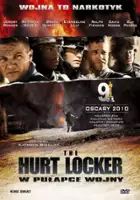The Hurt Locker. W pułapce wojny
The Hurt Locker
2008
powrót do forum filmu The Hurt Locker. W pułapce wojny
Po zobaczeniu filmu The Hurt Locker(W pułapce wojny) dochodzę do wnoisku, iż oskary przysłowiowo ''schodzą na psy '' film nie zbudził we mnie żadnych emocji i do oskarów mu baaardzooo dalekooo.. Jak nie można nie docenić takich filmów jak Skazani na Shawshank albo Siedem.
Jak można zapomnieć że "Skazani na Shawshank" rywalizowali z takimi filmami jak "Forrest Gump" i "Pulp Fiction"...
Jak można zapomnieć że Hurt locker rywalizował z W chmurach, Bękarty, wojny czy wreszcie w oim przekonaniu znakomity Avatar (choć w dzisiejszych czasach to obciach bo niebieskie)
Nie zapomniałem, też uważam sukcesy "THL" za zbyt duże, choć nagrodziłbym akurat nie te filmy, które wymieniłeś. I przecież wcale nie do tego piłem.
Zaiste, Avatar to wiekopomne dzieło w historii filmografii. Rozumiem że w młodzieńczym wieku można w oszołomieniu efektami specjalnymi nie zauważyć beznadziejnej, oklepanej fabuły i naiwnego przesłania ale żeby dać oscara ?
oj nie w młodzieńczym, nie w młodzieńczym niestety - "za dzieciaka" to się jarało w kinie Star wars (bez masteringu) i Godzillą oraz Superpotworem - masz rację lepiej dać Oskara tandetnemu, nieprawdopodobnemu sensacyjniakowi o bandyckiej wojnie o ropę niż dopracowanemu do najmniejszego detalu, prekursorskiemu jeśli chodzi o efekty 3d filmowi SF na który ustawiały się, w dobie gdy filmyściąga się z netu lub kupuje na nośniku w M 1 lub Makro, gigantyczne kolejki do KIN ????
Popularność nie jest żadnym wyznacznikiem jakości (jeżeli tak to hamburgery są najlepszym daniem).
"bandyckiej wojnie o ropę"
Nie ma kraju który mając możliwości militarne i polityczne nie broniłby swoich interesów. Więc w istocie USA piętnuje się nie za ich działania a za ich siłę. Mam wrażenie że ludzie powinni być raczej wdzięczni za taką a nie inną politykę USA bo w historii świata nie było tak "łagodnego" hegemona.
"tandetnemu, nieprawdopodobnemu sensacyjniakowi"
Film żadną miarą nie jest nieprawdopodobny jest co najwyżej nierealistyczny a to duża różnica. Jeśli z tą tandetą pijesz do głównego bohatera - kowboja i twierdzisz że takich ludzi nie ma muszę Cie zmartwić przykładem
http://pl.wikipedia.org/wiki/Daniel_Daly
Film uważam jako spojrzenie z innej strony na wojnę. Dotąd w filmografii dominowała przeświadczenie że wojna to piekło i wszyscy tak ją traktują. Wojna jednak jest zjawiskiem nie mogącym być jednoznacznie opisanym dobrze wyraził to Tim O' Brien w The Things They Carried:
How do you generalize?
War is hell, but that's not the half of it, because war is mystery and terror and adventure and courage and discovery and holiness and pity and despair and longing and love. War is nasty; war is fun. War is thrilling; war is drudgery. War makes you a man; war makes you dead.
The truths are contradictory. It can be argued, for instance, that war is grotesque. But in truth war is also beauty. For all its horror, you can't help but gape at the awful majesty of combat. You stare out at tracer rounds unwinding through the dark like brilliant red ribbons. You crouch in ambush as a cool, impassive moon rises over the nighttime paddies. You admire the fluid symmetries of troops on the move, the great sheets of metal-fire streaming down from a gunship, the illumination rounds, the white phosphorus, the purply orange glow of napalm, the rocket's red glare. It's not pretty, exactly. It's astonishing. It fills the eye. It commands you. You hate it, yes, but your eyes do not. Like a killer forest fire, like cancer under a microscope, any battle or bombing raid or artillery barrage has the aesthetic purity of absolute moral indifference - a powerful, implacable beauty - and a true war story will tell the truth about this, though the truth is ugly.
To generalize about war is like generalizing about peace. Almost everything is true. Almost nothing is true. Though it's odd, you're never more alive than when you're almost dead. You recognize what's valuable. Freshly, as if for the first time, you love what's best in yourself and in the world, all that might be lost. At the hour of dusk you sit at your foxhole and look out on a wide river turning pinkish red, and at the mountains beyond, and although in the morning you must cross the river and go into the mountains and do terrible things and maybe die, even so, you find yourself studying the fine colors on the river, you feel wonder and awe at the setting of the sun, and you are filled with a hard, aching love for how the world could be and always should be, but now is not.
Mitchell Sanders was right. For the common soldier, at least, war has the feel - the spiritual texture - of a great ghostly fog, thick and permanent. There is no clarity. Everything swirls. The old rules are no longer binding, the old truths no longer true. Right spills over into wrong. Order blends into chaos, hate into love, ugliness into beauty, law into anarchy, civility into savagery. The vapors suck you in. You can't tell where you are, or why you're there, and the only certainty is absolute ambiguity.
In war you lose your sense of the definite, hence your sense of truth itself, and therefore it's safe to say that in a true war story nothing is absolutely true.
o czym Ty do mnie pier.olisz - wklejasz jakieś posty z wikipedii - ten film to gó.no!!! i każdy kto ma odrobinę gustu i tzw. zdrowego rozsądku Ci to powie - ale jak chcesz możesz nawet przed nim walić konia - Twoje życie Twoja sprawa - ja panią Bigelow cenię wyłącznie za Point break - z którego zresztą zerżneła w ordynarny sposób ww. wymieniony film - ot nieudany autoplagiat...




